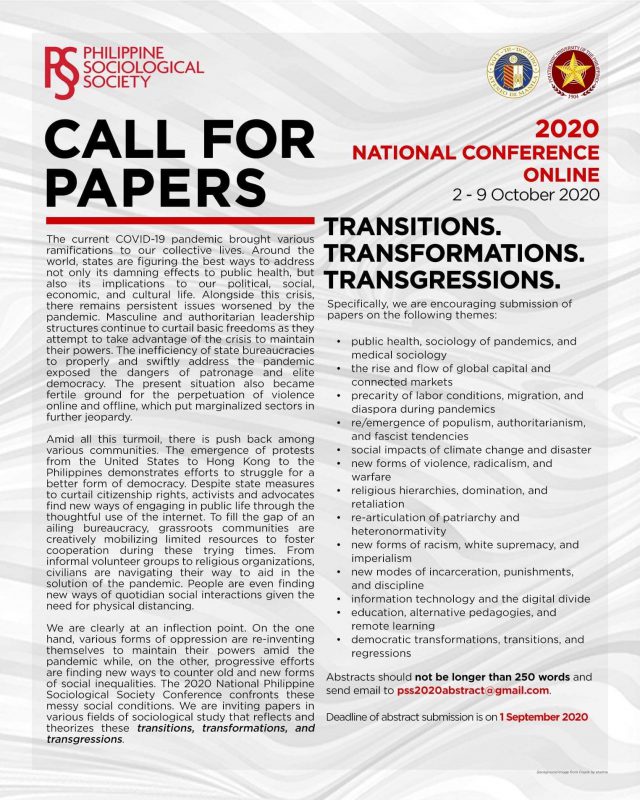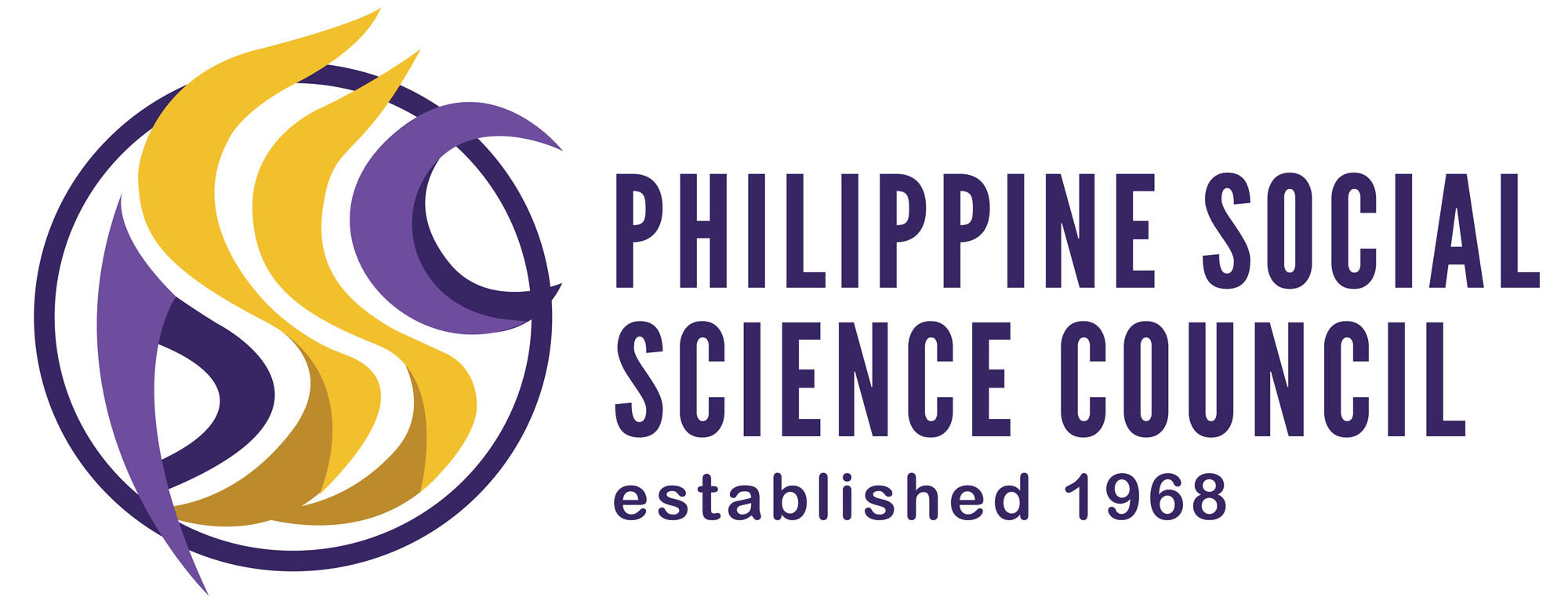Call for Papers: Philippine Sociological Society
- Posted on

The 2020 Philippine Sociological Society National Conference will be held online on 2-9 October 2020. This year’s theme: Transitions, Transformations, Transgressions.
The current COVID-19 pandemic brought various ramifications to our collective lives. Around the world, states are figuring the best ways to address not only its damning effects to public health, but also its implications to our political, social, economic, and cultural life. Alongside this crisis, there remains persistent issues worsened by the pandemic. Masculine and authoritarian leadership structures continue to curtail basic freedoms as they attempt to take advantage of the crisis to maintain their powers. The inefficiency of state bureaucracies to properly and swiftly address the pandemic exposed the dangers of patronage and elite democracy. The present situation also became fertile ground for the perpetuation of violence online and offline, which put marginalized sectors in further jeopardy.
Amid all this turmoil, there is push back among various communities. The emergence of protests from the United States to Hong Kong to the Philippines demonstrates efforts to struggle for a better form of democracy. Despite state measures to curtail citizenship rights, activists and advocates find new ways of engaging in public life through the thoughtful use of the internet. To fill the gap of an ailing bureaucracy, grassroots communities are creatively mobilizing limited resources to foster cooperation during these trying times. From informal volunteer groups to religious organizations, civilians are navigating their way to aid in the solution of the pandemic. People are even finding new ways of quotidian social interactions given the need for physical distancing.
We are clearly at an inflection point. On the one hand, various forms of oppression are re-inventing themselves to maintain their powers amid the pandemic while, on the other, progressive efforts are finding new ways to counter old and new forms of social inequalities. The 2020 National Philippine Sociological Society Conference confronts these messy social conditions. We are inviting papers in various fields of sociological study that reflects and theorizes these transitions, transformations, and transgressions.
Specifically, we are encouraging submission of papers on the following themes:
- public health, sociology of pandemics, and medical sociology
- the rise and flow of global capital and connected markets
- precarity of labor conditions, migration, and diaspora during pandemics
- re/emergence of populism, authoritarianism, and fascist tendencies
- social impacts of climate change and disaster
- new forms of violence, radicalism, and warfare
- religious hierarchies, domination, and retaliation
- re-articulation of patriarchy and heteronormativity
- new forms of racism, white supremacy, and imperialism
- new modes of incarceration, punishments, and discipline
- information technology and the digital divide
- education, alternative pedagogies, and remote learning
- democratic transformations, transitions, and regressions
- rethinking human rights, citizenship, and political participation
- new trends in social movements and contentious politics
- addressing issues of grassroots organizing and labor unions
- re/discovering indigenous knowledge and wisdom
- re/constructing ethnic, regional, and national identities
- re-articulating queerness, femininities, and masculinities
- transitions and transformations of religious lives
- climate justice, disaster risk reduction, and alternative energies
Abstracts should not be longer than 250 words and send email to pss2020abstract@gmail.com. Deadline of abstract submission is on 1 September 2020.
The 2020 Philippine Sociological Society National Conference will be held online on 2-9 October 2020. This year’s theme: Transitions, Transformations, Transgressions.
The current COVID-19 pandemic brought various ramifications to our collective lives. Around the world, states are figuring the best ways to address not only its damning effects to public health, but also its implications to our political, social, economic, and cultural life. Alongside this crisis, there remains persistent issues worsened by the pandemic. Masculine and authoritarian leadership structures continue to curtail basic freedoms as they attempt to take advantage of the crisis to maintain their powers. The inefficiency of state bureaucracies to properly and swiftly address the pandemic exposed the dangers of patronage and elite democracy. The present situation also became fertile ground for the perpetuation of violence online and offline, which put marginalized sectors in further jeopardy.
Amid all this turmoil, there is push back among various communities. The emergence of protests from the United States to Hong Kong to the Philippines demonstrates efforts to struggle for a better form of democracy. Despite state measures to curtail citizenship rights, activists and advocates find new ways of engaging in public life through the thoughtful use of the internet. To fill the gap of an ailing bureaucracy, grassroots communities are creatively mobilizing limited resources to foster cooperation during these trying times. From informal volunteer groups to religious organizations, civilians are navigating their way to aid in the solution of the pandemic. People are even finding new ways of quotidian social interactions given the need for physical distancing.
We are clearly at an inflection point. On the one hand, various forms of oppression are re-inventing themselves to maintain their powers amid the pandemic while, on the other, progressive efforts are finding new ways to counter old and new forms of social inequalities. The 2020 National Philippine Sociological Society Conference confronts these messy social conditions. We are inviting papers in various fields of sociological study that reflects and theorizes these transitions, transformations, and transgressions.
Specifically, we are encouraging submission of papers on the following themes:
- public health, sociology of pandemics, and medical sociology
- the rise and flow of global capital and connected markets
- precarity of labor conditions, migration, and diaspora during pandemics
- re/emergence of populism, authoritarianism, and fascist tendencies
- social impacts of climate change and disaster
- new forms of violence, radicalism, and warfare
- religious hierarchies, domination, and retaliation
- re-articulation of patriarchy and heteronormativity
- new forms of racism, white supremacy, and imperialism
- new modes of incarceration, punishments, and discipline
- information technology and the digital divide
- education, alternative pedagogies, and remote learning
- democratic transformations, transitions, and regressions
- rethinking human rights, citizenship, and political participation
- new trends in social movements and contentious politics
- addressing issues of grassroots organizing and labor unions
- re/discovering indigenous knowledge and wisdom
- re/constructing ethnic, regional, and national identities
- re-articulating queerness, femininities, and masculinities
- transitions and transformations of religious lives
- climate justice, disaster risk reduction, and alternative energies
Abstracts should not be longer than 250 words and send email to pss2020abstract@gmail.com. Deadline of abstract submission is on 1 September 2020.
The 2020 Philippine Sociological Society National Conference will be held online on 2-9 October 2020. This year’s theme: Transitions, Transformations, Transgressions.
The current COVID-19 pandemic brought various ramifications to our collective lives. Around the world, states are figuring the best ways to address not only its damning effects to public health, but also its implications to our political, social, economic, and cultural life. Alongside this crisis, there remains persistent issues worsened by the pandemic. Masculine and authoritarian leadership structures continue to curtail basic freedoms as they attempt to take advantage of the crisis to maintain their powers. The inefficiency of state bureaucracies to properly and swiftly address the pandemic exposed the dangers of patronage and elite democracy. The present situation also became fertile ground for the perpetuation of violence online and offline, which put marginalized sectors in further jeopardy.
Amid all this turmoil, there is push back among various communities. The emergence of protests from the United States to Hong Kong to the Philippines demonstrates efforts to struggle for a better form of democracy. Despite state measures to curtail citizenship rights, activists and advocates find new ways of engaging in public life through the thoughtful use of the internet. To fill the gap of an ailing bureaucracy, grassroots communities are creatively mobilizing limited resources to foster cooperation during these trying times. From informal volunteer groups to religious organizations, civilians are navigating their way to aid in the solution of the pandemic. People are even finding new ways of quotidian social interactions given the need for physical distancing.
We are clearly at an inflection point. On the one hand, various forms of oppression are re-inventing themselves to maintain their powers amid the pandemic while, on the other, progressive efforts are finding new ways to counter old and new forms of social inequalities. The 2020 National Philippine Sociological Society Conference confronts these messy social conditions. We are inviting papers in various fields of sociological study that reflects and theorizes these transitions, transformations, and transgressions.
Specifically, we are encouraging submission of papers on the following themes:
- public health, sociology of pandemics, and medical sociology
- the rise and flow of global capital and connected markets
- precarity of labor conditions, migration, and diaspora during pandemics
- re/emergence of populism, authoritarianism, and fascist tendencies
- social impacts of climate change and disaster
- new forms of violence, radicalism, and warfare
- religious hierarchies, domination, and retaliation
- re-articulation of patriarchy and heteronormativity
- new forms of racism, white supremacy, and imperialism
- new modes of incarceration, punishments, and discipline
- information technology and the digital divide
- education, alternative pedagogies, and remote learning
- democratic transformations, transitions, and regressions
- rethinking human rights, citizenship, and political participation
- new trends in social movements and contentious politics
- addressing issues of grassroots organizing and labor unions
- re/discovering indigenous knowledge and wisdom
- re/constructing ethnic, regional, and national identities
- re-articulating queerness, femininities, and masculinities
- transitions and transformations of religious lives
- climate justice, disaster risk reduction, and alternative energies
Abstracts should not be longer than 250 words and send email to pss2020abstract@gmail.com. Deadline of abstract submission is on 1 September 2020.
